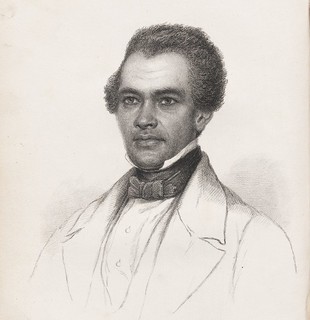
PREV ARTICLE
NEXT ARTICLE
FULL ISSUE
PREV FULL ISSUE
WILLIAM WELLS BROWN, WILDCAT BANKER?An article by Ross Bullen in the Public Domain Review chronicles the life of William Wells Brown and his experience issuing scrip notes in the wildcat banking era. -Editor
Brown would become a popular and prolific anti-slavery lecturer and a vocal supporter of social reform. While never working exclusively as a writer, he achieved success across multiple literary modes. With the debut of The Escape; or A Leap to Freedom (1858), Brown became the first published African American playwright, while his The Negro in the American Rebellion (1867) is considered the first military history of African Americans. He wrote the earliest African American travelogue and, later in his life, was a practicing physician.
As Brown tells it, in the fall of 1835, he found himself broke in Monroe, Michigan, having been cheated out of his summer's earnings by a dishonest steamship captain. Brown sought employment with the local barber and, after being repeatedly turned down, he embraced the spirit of the free market and opened his own shop directly across the street from his competition. According to Brown, one of the barber's customers offered him At this time, money matters in the Western States were in a sad condition. Any person who could raise a small amount of money was permitted to establish a bank, and allowed to issue notes for four times the sum raised. This being the case, many persons borrowed money merely long enough to exhibit to the bank inspectors, and the borrowed money was returned, and the bank left without a dollar in its vaults, if indeed it had a vault about its premises. The result was that banks were started all over the Western States, and the country flooded with worthless paper. These were known as the ‘Wild Cat Banks.' Silver coin being very scarce, and the [state-chartered] banks not being allowed to issue notes for a smaller amount than one dollar, several persons put out notes of from 6 to 75 cents in value; these were called ‘Shinplasters.' The Shinplaster was in the shape of a promissory note, made payable on demand. I have often seen persons with large rolls of these bills, the whole not amounting to more than five dollars.
As Brown explains it, the lack of small change in Monroe — a nationwide scarcity in this period — created a demand for shinplasters: small denomination bills issued by private businesses serving as Wildcat banks (like Brown's barber shop) and backed by nothing more than the confidence of the local community. In Bank Notes and Shinplasters: The Rage for Paper Money in the Early Republic, Joshua R. Greenberg recounts how during the 1830s these western banks were often labelled as fraudulent,
Although people in Monroe may have been skeptical of Brown's shinplasters, their desperation for small denomination bills ultimately outweighed any suspicions about Brown. The complete article is well worth reading for additional color on the wildcat banking era. But the story recounted by Mr. Brown may or may not be true - versions of it appeared in many of his writings over the years. I checked my copy of Haxby and see no such notes from Monroe, MI. Do shinplasters for William Wells Brown's establishment exist? -Editor
To read the complete article, see:
Wayne Homren, Editor The Numismatic Bibliomania Society is a non-profit organization promoting numismatic literature. See our web site at coinbooks.org. To submit items for publication in The E-Sylum, write to the Editor at this address: whomren@gmail.com To subscribe go to: https://my.binhost.com/lists/listinfo/esylum All Rights Reserved. NBS Home Page Contact the NBS webmaster 
|

